| Rolls-Royce Silver Seraph | |
|---|---|
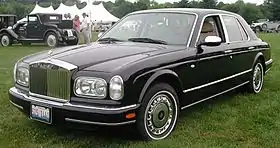 | |
| Overview | |
| Manufacturer | Rolls-Royce Motors |
| Production | 1998–2002 |
| Model years | 1999–2002 |
| Assembly | United Kingdom: Crewe, England |
| Designer | Steve Harper under Graham Hull |
| Body and chassis | |
| Class | Full-size luxury car (F) |
| Body style | 4-door saloon |
| Layout | Front-engine, rear-wheel-drive |
| Related | Bentley Arnage |
| Powertrain | |
| Engine | 5.4 L M73TUB54 V12 |
| Transmission | 5-speed ZF 5HP30 automatic |
| Dimensions | |
| Wheelbase | 3,117 mm (122.7 in) 3,366 mm (132.5 in) (Park Ward)[1] |
| Length | 5,390 mm (212.2 in) 5,639 mm (222 in) (Park Ward)[2] |
| Width |
|
| Height | 1,514 mm (59.6 in) |
| Kerb weight | 2,350 kg (5,181 lb) 2,450 kg (5,401 lb) (Park Ward) |
| Chronology | |
| Predecessor | Rolls-Royce Silver Spirit |
| Successor | Rolls-Royce Ghost (Silver Seraph) Rolls-Royce Ghost EWB (Park Ward) Rolls-Royce Phantom VII (Park Ward) |
The Rolls-Royce Silver Seraph is a large luxury automobile produced by Rolls-Royce Motors from 1998 to 2002. First unveiled on 3 March 1998 at the Geneva Motor Show, it replaced the Silver Spirit, which ended production in 1997. Silver Seraph production was discontinued when the licence to use the Rolls-Royce marque was sold to BMW, which began manufacture of an unrelated line of vehicles under a new corporation, Rolls-Royce Motor Cars.
Development
Development of the Silver Seraph began in the late 1980s, with design work commencing in October 1990. By April 1991, the conceptual design was frozen and approved by the management in June 1991.[3] After several refinements were made, the definitive design was reached in 1994. On 28 July 1995 design patents were filed for both the Rolls-Royce Silver Seraph[4] and Bentley Arnage[5] utilizing production design prototypes as representations. Development concluded after nearly a decade in late 1997, with pilot production models being produced into early 1998 bearing R396 DTU registration plates. The Silver Seraph was launched at the 1998 Geneva Motor Show.
Description
Aside from the radiator grille, badges and wheels, the Seraph was externally identical to the contemporary Bentley Arnage, sharing both its platform and body shell. It was powered by the BMW M73 engine, a 5.4L aluminium alloy V12 engine coupled to a 5-speed automatic transmission, making it the first twelve-cylinder Rolls-Royce since the 1939 Phantom III. The car conforms to the Euro III emission standards.
The body was 65 per cent stiffer than that of its predecessor. Standard electronics included digital engine management, adaptive ride control and anti-lock brakes. The exterior was available in one and two-tone finishes.
Inside, the Rolls-Royce Silver Seraph and the Bentley Arnage were similar yet distinct. The Seraph's gear selector was column-mounted, and gauges followed a traditional Rolls-Royce layout. In both cars, the seats and dashboard were upholstered in Connolly Leather, with dashboard trim and folding picnic trays for rear passengers faced with glossy burl walnut veneer.
The Seraph was known for its relatively limited acceleration and comfortable handling, in comparison to the Arnage, which had a twin turbocharged V8 of its own design and firmer suspension. However, the Seraph still had a top speed of 225 km/h or 140 mph.
The RAC gave the car a rating of 7.6/10, stating "The Silver Seraph marks a new start for Rolls-Royce in their quest to once more be recognised as manufacturers of the world's best cars. And it's quite a credible effort.[6]
Production
All Seraphs were hand-built at the Rolls-Royce factory in Crewe, England. The car had a base price of £155,175 in the UK and $220,695 in the US. It was second in cost and exclusivity only to the Rolls-Royce Corniche, though it was the cheapest Rolls-Royce per se after the discontinuation of the Silver Spur.
A total of 1,570 Silver Seraphs were produced before manufacture ceased in 2002 with the last 170 cars being under the "Last of Line" Specification. (Distinguished by Wing badges, Commemorative Plaque, Chromed Mirror caps, Spirit of Ecstasy Hubcaps & Red Rolls Royce badging)
Park Ward model
An extended wheelbase 5-passenger version of the Silver Seraph called the Park Ward debuted at the 2000 Geneva Motor Show. Introduced for the 2001 model year, it had 250 mm (9.8 in) added to the size of the doors (mostly the rear), resulting in more leg room for passengers. Rolls-Royce initially planned to build 200 of the model. However, it was discontinued after 2002, with a total of 127 having been produced.[7] It was the last model to use the Park Ward label.
Gallery
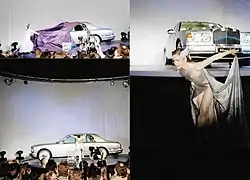 Press presentation, Geneva 1998
Press presentation, Geneva 1998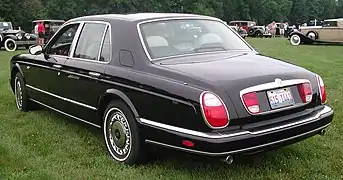 Silver Seraph Rear View
Silver Seraph Rear View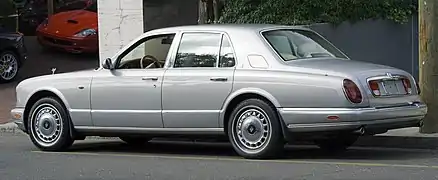 Silver Seraph quarter rear view
Silver Seraph quarter rear view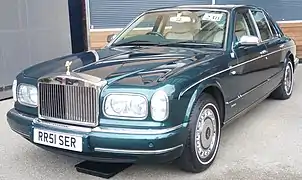 Silver Seraph "Last of Line" quarter front view
Silver Seraph "Last of Line" quarter front view.jpg.webp) Silver Seraph in an Optional two-tone paint job (front view)
Silver Seraph in an Optional two-tone paint job (front view)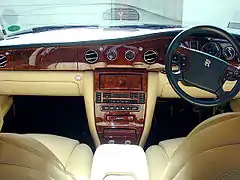 Interior
Interior
References
- ↑ "Rolls-Royce Park Ward - Specifications (2001-2002)". encycarpedia.com. Retrieved 15 October 2021.
- ↑ "Rolls-Royce Park Ward - Specifications (2001-2002)". encycarpedia.com. Retrieved 15 October 2021.
- ↑ "SHADO - Car Design Consultancy". shado.co.uk.
- ↑ "Automobile".
- ↑ "Automobile".
- ↑ "Rolls-Royce Silver Seraph (1998-2005)". RAC. Archived from the original on 2 October 2011. Retrieved 17 August 2011.
- ↑ "Rolls-Royce Park Ward". www.rrab.com. Retrieved 9 March 2019.